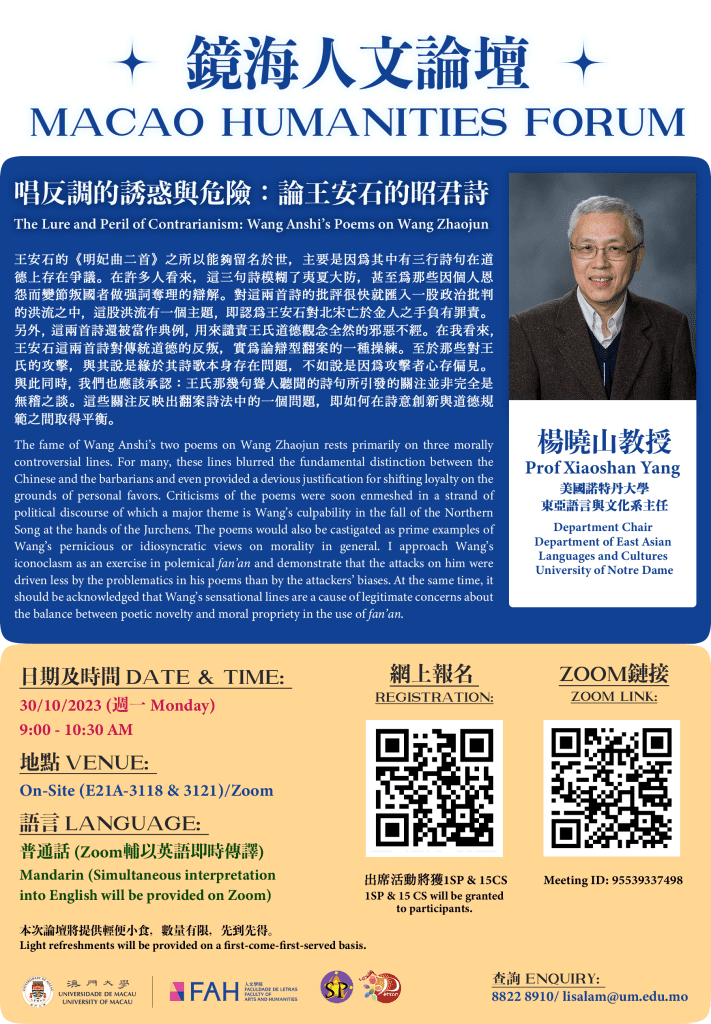Reminder :【Macao Humanities Forum】The Lure and Peril of Contrarianism: Wang Anshi’s Poems on Wang Zhaoju by Prof Xiaoshan Yang, 30 Oct (1 Smart Point & 15CS)
提提你:【鏡海人文論壇】唱反調的誘惑與危險:論王安石的昭君詩 – 楊曉山教授 -10月30日 (1粒至叻星及15個CS)
出席活動的同學可獲一粒至叻星及全人發展獎勵計劃“知識整合能力”項的15個CS
Participating Students will be awarded 1 SAO Smart Point and 15 CS on“Knowledge integration” in the Whole Person Development Award Programme
澳門大學人文學院將於2023年10月30日(週一)上午09時於ZOOM及E21A-3118 & 3121 舉行“鏡海人文論壇”,該論壇將邀請不同研究領域的知名學者分享他們的研究成果。本次論壇邀請了楊曉山教授就“唱反調的誘惑與危險:論王安石的昭君詩”主題進行線上演講。
活動詳情:
講者:楊曉山教授
題目:唱反調的誘惑與危險:論王安石的昭君詩
日期:2023年10月30日(週一)
時間:上午09:00 – 10:30
地點:線下(E21A – 3118 /3121 觀看Zoom)/ 線上
語言:普通話(Zoom輔以英語即時傳譯)
*本次論壇將提供輕便小食,數量有限,先到先得。
有興趣人士請於2023年10月26日或以前經 https://umac.au1.qualtrics.com/jfe/form/SV_9mh7aTNTGbTMYo6 報名。
演講摘要:
王安石的《明妃曲二首》之所以能夠留名於世,主要是因爲其中有三行詩句在道德上存在爭議。在許多人看來,這三句詩模糊了夷夏大防,甚至爲那些因個人恩怨而變節叛國者做强詞奪理的辯解。對這兩首詩的批評很快就匯入一股政治批判的洪流之中,這股洪流有一個主題,即認爲王安石對北宋亡於金人之手負有罪責。另外,這兩首詩還被當作典例,用來譴責王氏道德觀念全然的邪惡不經。在我看來,王安石這兩首詩對傳統道德的反叛,實爲論辯型翻案的一種操練。至於那些對王氏的攻擊,與其說是緣於其詩歌本身存在問題,不如說是因爲攻擊者心存偏見。與此同時,我們也應該承認:王氏那幾句聳人聽聞的詩句所引發的關注並非完全是無稽之談。這些關注反映出翻案詩法中的一個問題,即如何在詩意創新與道德規範之間取得平衡。
講者簡介:
楊曉山教授,美國諾特丹大學東亞語言與文化系系主任、美國哈佛大學比較文學博士。主要研究領域為中國古典詩學及唐宋詩歌文化。代表著作有《感知與再現:中英詩歌自然意象說的比較研究》、《私人領域的變形:唐宋詩歌中園林與玩好》、《王安石與宋代詩歌文化》等。其學術研究曾獲美國人文基金會及美國學術團體協會的贊助。
We are very pleased to announce that the 1st Lecture of the FAH Macao Humanities Forum (2023/2024) will be held on 30 Oct 2023. The forum aims to provide a platform for world-renowned scholars from diverse humanities fields to share their research with the FAH community and other UM scholars. All members of the UM community are cordially invited to this splendid event.
In this upcoming forum, we are honored to have Professor Xiaoshan Yang as our guest speaker to deliver an online lecture on the topic “The Lure and Peril of Contrarianism: Wang Anshi’s Poems on Wang Zhaojun”. Prof Yang is the Department Chair and Professor in the Department of East Asian Languages and Cultures at the University of Notre Dame. He received his Ph.D. in Comparative Literature from Harvard University. His representative publications include To Perceive and to Represent: A Comparative Study of Chinese and English Poetics of Nature Imagery, Metamorphosis of the Private Sphere: Gardens and Objects in Tang-Song Poetry (Harvard 2003), and Wang Anshi and Song Poetic Culture (Harvard 2021). His research has been recognized with grants by the National Endowment for the Humanities and the American Council of Learned Societies. His research interests include classical Chinese poetry, language and poetics.
Details of the forum are as follows:
Speaker: Professor Xiaoshan Yang 楊曉山教授
Topic: The Lure and Peril of Contrarianism: Wang Anshi’s Poems on Wang Zhaojun 唱反調的誘惑與危險:論王安石的昭君詩
Date: 30 Oct 2023 (Mon)
Time: 09:00 – 10:30 AM
Venue: On-Site (E21A-3118 and 3121) / ZOOM
Language: Mandarin (with simultaneous interpretation into English on Zoom)
*Light refreshments will be provided on a first-come-first-served basis
Please register for the forum by 26 Oct 2023 (Thur) via https://umac.au1.qualtrics.com/jfe/form/SV_9mh7aTNTGbTMYo6
Abstract:
The fame of Wang Anshi’s two poems on Wang Zhaojun rests primarily on three morally controversial lines. For many, these lines blurred the fundamental distinction between the Chinese and the barbarians and even provided a devious justification for shifting loyalty on the grounds of personal favors. Criticisms of the poems were soon enmeshed in a strand of political discourse of which a major theme is Wang’s culpability in the fall of the Northern Song at the hands of the Jurchens. The poems would also be castigated as prime examples of Wang’s pernicious or idiosyncratic views on morality in general. I approach Wang’s iconoclasm as an exercise in polemical fan’an and demonstrate that the attacks on him were driven less by the problematics in his poems than by the attackers’ biases. At the same time, it should be acknowledged that Wang’s sensational lines are a cause of legitimate concerns about the balance between poetic novelty and moral propriety in the use of fan’an.

